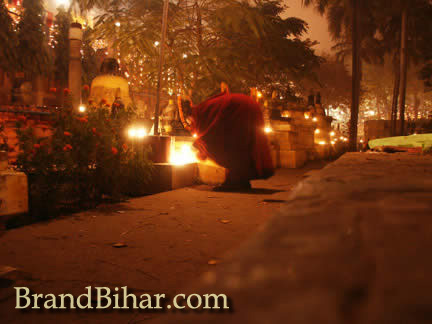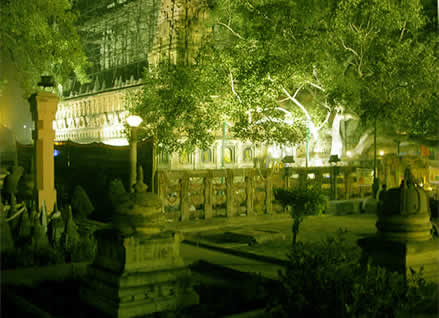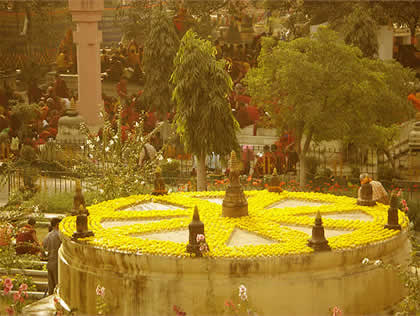|
|
Buddha Purnima (usually in April/may)

Buddha Purnima or Buddha Jayanti, the birth anniversary of the Buddha, is widely celebrated, on a full moon night in April/May. The Buddha was born on the full-moon day in the month of Vaisakh in 563 BC. He achieved enlightenment as well as nirvana on the same date.
 It is also believed that Yashodara, the Buddha's wife, his charioteer Channa and even his horse Kantaka were born on the same day. On this day, Buddhists offer prayers in their temples. Sarnath in Uttar Pradesh and Bodh Gaya in Bihar are the main centres of celebration. It is also believed that Yashodara, the Buddha's wife, his charioteer Channa and even his horse Kantaka were born on the same day. On this day, Buddhists offer prayers in their temples. Sarnath in Uttar Pradesh and Bodh Gaya in Bihar are the main centres of celebration.
During Vaisakh, Buddhists celebrate the life of the Buddha and his teachings. They remember the night of his enlightenment and his insights into his previous lives, as well as his revelations about the nature of death, karma and rebirth, suffering and desire.
Vaisakh is celebrated with great joy and vivid colours. Homes are cleaned and decorated in preparation. Celebrations begin before dawn, when devotees throng the temples early in the morning to meditate and take the Five Precepts. Sutras are chanted by monks.

Celebrations vary from one country to another. ‘The Bathing of the Buddha’ often takes place. Water is poured over the shoulders of statues of the Buddha as a reminder of the need to purify the heart and mind. Offerings are made to the monks and the temples, and may be laid on the altar as a sign of respect for the Buddha and his teachings.
In China, traditional elements from Chinese culture, such as dancing dragons, are incorporated into celebrations. In Indonesia, Wesak lanterns are made from paper and wood. Another popular custom in some countries is the release of caged birds, symbolising letting go of troubles and wishing that all beings be well and happy. Buddhists in some parts of the world make origami paper cranes which are used as decorations or sometimes floated down rivers to symbolise the same thing.
Many Buddhist temples serve vegetarian food (as many Buddhists avoid eating meat). Special lectures on the teachings of the Buddha are given, and candle lit processions take place through the streets. Observers are made welcome, both in processions and at temples.
Back To BuddhaBihar Mennu Page

|
|
|